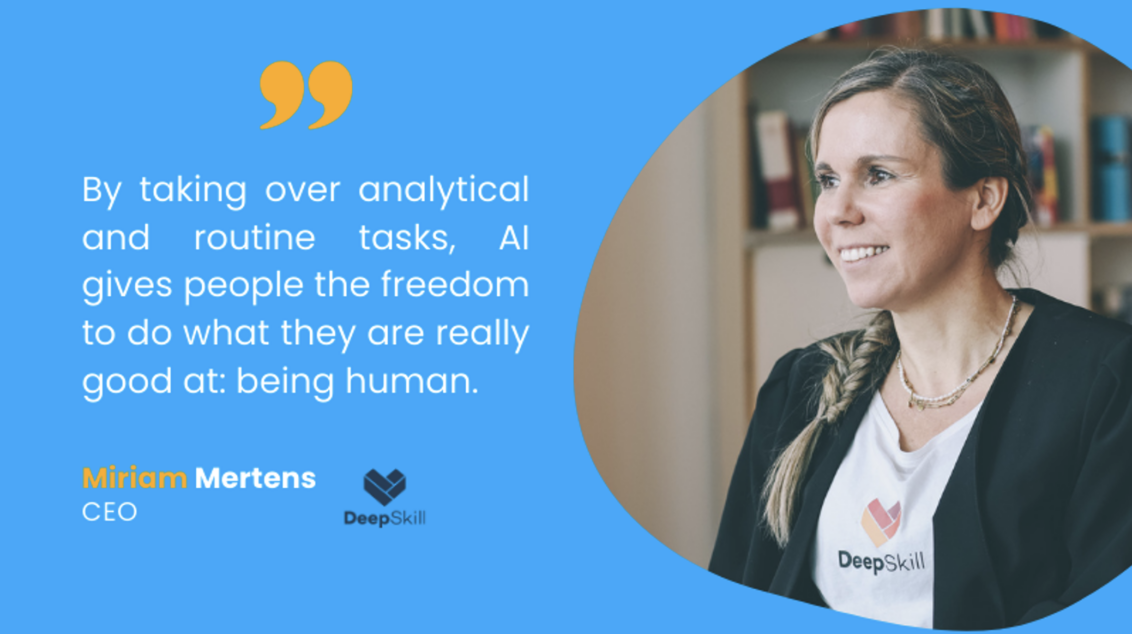AI in HR: Overcome the fear, embrace the opportunities!
10 steps to responsible HR work
AI is neither all good nor all bad. Used correctly, it can improve the lives of many people in general and working life in particular. New opportunities are opening up in HR recruitment and development in particular, without people being ” sorted out ” or replaced by technology. Let’s take a look at what is important for a fearless, constructive and responsible approach to AI in HR.
1. Be aware that AI cannot make decisions.
The question of whether an AI can decide about a person’s professional future becomes obsolete if we realise that the technology cannot make decisions on its own. But it can make us believe that it can. In the end, the AI accesses codified human decisions in order to carry out an action (decision). In other words: What the human doesn’t put in, the machine can’t put out. Or as the authors of ‘Power and Prediction’ put it: ‘Nobody ever lost a job to a robot. They lost a job because of the way someone decided to program a robot.’ If we are aware of this, we can develop a (self-)conscious and responsible approach to AI.
2. Make the ‘why and what for’ the starting point for the use of AI.
Before organisations rush into using new technologies, they should ask themselves what specific problems they want to solve with AI. It makes little sense to collect and analyse huge amounts of data if the objectives and benefits are not clear. These considerations should be based primarily on the needs of the people who are connected to the company in some way, while also taking into account the cost-benefit ratio. With regard to AI-supported personality analysis tools, companies can ask themselves:
- What does a bad hire cost me with all the resulting consequences (morale throughout the team, offboarding, job advertisement, new candidate search, onboarding, training phase…)?
- What does it cost me in return if I invest in technology that makes bad hires unlikely?
3. Keep working on your culture when using AI.
Algorithms are often so complex that even developers cannot always fully understand them. In order to use the technology in a way that benefits both employees and the organisation as a whole, companies need to work more on their culture – more specifically, on a culture that promotes the ethical and responsible use of technology. Guiding questions could be:
- How do we want to work together?
- What values characterise our work and teamwork?
- How do we define success?
- How do we make decisions?
- How do we solve conflicts?
It should be a key part of the corporate culture to continuously reflect on existing thought patterns, behaviours and unconscious biases. Employees need time and safe spaces to be able to ask themselves and others critical questions. Open formats in which all employees can participate should be regularly offered specifically on the topic of ‘Dealing with AI’. This allows knowledge and experience to be shared and blind spots in working with AI and data to be recognised at an early stage.
4. Learn to distinguish good data from bad data
The type of data we use to train AI systems is crucial. If we use biased or prejudiced data, the machine will deliver results that further amplify stereotypical attributions and discrimination. We therefore need mandatory quality criteria for training data. Answers to the following questions, among others, provide guidance:
- Was the AI trained with biased data or with data that represents the overall average of the population?
- In the case of questionnaire-based data collection: Were there any possible incentives for participants to provide false information when gathering the training data?
- For language models: Does the AI only analyse individual words and pay attention to correct grammar, or does it try to capture the whole context? (Particularly important with regard to the discriminatory feature ‘native speakers’).
There are many more.
5. Be diverse.
Diversity is more important than ever in times of AI. A diverse workforce brings different experiences and perspectives to the discussion about the ethical use of AI systems. This not only helps to improve the quality of decision-making, but also to recognise and reduce unconscious bias.
6. Take a realistic look at the role of AI in the decision-making process.
A fearless and constructive approach to AI technology requires that such analysis tools are only one of several factors in decision-making processes. They serve as a source of additional information that makes it easier for recruiters, for example, to make a final decision in favour of or against an applicant. It should be clear to everyone that AI predictions are never perfect. AI-based analyses are based on empirical data and scientific principles, but nothing more. In AI-supported personality analyses, as we develop them at Zortify, the error rate is realistically between two and five per cent. If we are aware of this, we can deal with it and develop suitable behaviours for the use of AI in organisations together with the employees who use the technology.
7. Make processes transparent (not data sets).
In personality analyses in particular, it is not only HR managers who need to understand how the AI comes to its results, but also the people affected, such as candidates. The keyword here is ‘Explainable AI’. But how can companies explain something so complex that also contains valuable information, for example for competitors? It remains uncertain what benefit applicants could derive from access to raw data or complex equations, as these are often difficult to understand and are not sufficient on their own to recognise bias in the right context.
The U.S. Association of Computing Machinery has developed a pragmatic approach. It requires that institutions using algorithmic decision-making be able to explain the underlying process of the algorithm and the resulting decisions in non-technical language. The aim is therefore not to disclose technical details in detail, but to improve transparency in two areas: the processes and the results. To do this, people need a deep understanding of how AI gets its results (as an example, take a look at our Zortify certification programme).
The ethical design of processes in dealing with AI begins long before the AI is actually used. Think about when and who you need to involve internally in the process – from the data protection officer to the procurement team to the work council. (A corresponding ‘onboarding package’ from Zortify is in the making. If you haven’t subscribed to our newsletter yet, now would be a good time to find out more soon 😉).
8. Create suitable team roles.
AI technology is too important to be left to just a small group of ‘IT nerds’. Instead, an open discussion about the responsible use of algorithms and data should be initiated across the entire workforce. This requires people at the intersection of IT, business departments, HR and corporate culture who actively drive these discussions forward and document progress. Positions such as ‘AI ethicist’ or ‘human-robot relations manager’ are not abstract figures of a distant future, but are already in demand today.
9. Allow yourself to have healthy doubts: about the AI and about yourself.
Just as we shouldn’t blindly trust the machine, we shouldn’t blindly trust ourselves either. Humans make mistakes, carry biases, are sometimes bad-tempered or overconfident and don’t always make wise decisions. Nonetheless, we can allow ourselves to listen to our instincts and intuition.
AI systems can help us not to be blinded by first impressions. They can make established procedures, such as assessment centres, more objective and fair. Above all, they can make them faster and cheaper, thus creating the freedom to constantly reflect on ourselves and engage in deep interaction with others (such as applicants) so that we are ultimately able to make the best decision.
10. Be honest with yourselves: What can AI do better?
In the discussion about Artificial Intelligence, the potential risks are often emphasised. Without ignoring these, companies should consciously shift their focus and ask themselves when they last had an in-depth discussion about human bias and the subjectivity of recruitment decisions.
The fact is: AI systems can perform some tasks better than humans. In the area of recruitment and employee development, technology can analyse decision-relevant information faster than an entire team ever could. It uncovers aspects that escape the human eye even on second glance, thus contributing to better decisions – better for applicants, better for HR professionals, better for the entire organisation. As a result, it can make a valuable contribution to the search for talent and equip companies to meet the complex challenges of our time.
Employee analysis with AI: Make transparent what makes us transparent!
How much transparency is good for people and companies? – In times of Artificial Intelligence, the question of transparency has come back into focus. While we had slowly become accustomed to moving through the analogue and digital world as “transparent people”, the question of how transparent people and processes may, should and must be takes on new relevance due to the increased use of AI.
How to find and promote optimistic and resilient employees
Today’s working world puts the resilience and optimism of many people to the test. Digitalisation and automation require employees to regularly adapt to new technologies and working conditions. This calls not only for flexibility, but also emotional stability. According to the ‘State of the Global Workplace’ report by Gallup (2022), 44% of employees worldwide stated that they are under stress every day.
Hybrid work personality: The ‘person first’ approach and the role of AI
AI-based personality assessments can make a significant contribution to optimizing hybrid working environments. A recent survey found that 8 out of 10 employers have lost talent due to the obligation to return to the office, underlining the need for a balanced and personalized approach. ‘Person first’ as an extension of “people first”.
Employee analysis with AI: Make transparent what makes us transparent!
How much transparency is good for people and companies? – In times of Artificial Intelligence, the question of transparency has come back into focus. While we had slowly become accustomed to moving through the analogue and digital world as “transparent people”, the question of how transparent people and processes may, should and must be takes on new relevance due to the increased use of AI. This is because AI systems are able to influence decisions that have far-reaching consequences. For example for the success of companies, but also for the working lives of many people.
Transparency = Progress
In recent years, increasing transparency in companies has been a sign of progress. Many companies have realized that it doesn’t make sense to operate in silos. And that in the face of increasingly complex challenges, it is wiser to share knowledge and collaborate across departments. The classic hierarchy pyramid no longer has a good reputation. Many young talents in particular want a working environment at eye level, and the opportunity to help shape things instead of just executing them.
In organizations of a new type, there are dynamic roles instead of fixed positions, salaries and vacation days are sometimes openly visible or negotiated in the team. Some organizations are also embracing transparency in areas that were once clearly separated from the work context, such as physical and mental health. For example, there are codes, tools and processes if the colleague cannot attend the meeting due to a panic attack or the colleague with menstrual pain is not fully productive.
The vulnerable leader
There is also a growing awareness at management level of the importance of transparency to motivate teams, build trust and make the right decisions. Managers who show themselves to be fallible also take away their colleagues’ fear of making mistakes and thus create an environment in which new things can be tried out. By openly dealing with wrong decisions and setbacks, they reduce the likelihood that they will be repeated. Ideally, they act as mentors, let their employees participate in their learning and development process. And are thus role models and compasses for their team. Those who consistently live New Leadership do not see themselves as solution providers. But first and foremost as listeners and networkers with the aspiration to connect the right personalities at the right time and to bring them into the right positions in the company.
Really understand what’s going on with AI
This is exactly where artificial intelligence comes into play and with it a new level of possible transparency in organizations. This is because AI systems enable a deep understanding of the people who are involved with the organization. Whether as applicants or employees – their behaviours, motivations and emotions.
At Zortify, we use NLP (Natural Language Processing) tools and can thus achieve a level of Active Listening that only very few people master. Instead of just looking at CVs or job titles, we use open-ended questions and let the AI listen deeply. It not only processes what is said, but also recognizes what is really meant. And it can do that on a large scale. This way, it can significantly strengthen and support human intelligence instead of replacing it. Specifically, it can help people who are making decisions about other people’s next career move to make better decisions, significantly improving the quality of their work.
Making transparent what makes us transparent
AI that uses natural language to identify the personality of candidates, analyzes their entrepreneurial capital. And can also detect whether a person has a tendency towards toxic behavior creates an unprecedented level of transparency in organizations. This helps companies to find people who are a perfect fit for them. Expensive misplacements are avoided; team spirit and innovative strength are improved.
A look at the numbers:
- Time it takes for a new hire to reach full productivity after a previous misplacement: 1 to 2 years
- Time from new hire to profitability at middle management level: 6 months
- Percentage of companies reporting a decline in morale due to poor hiring: 37%
Applicants also benefit because they are more likely to find a position that matches their personality in a company that shares their values.
However, it is also clear that this level of transparency places high demands on the ethical handling of the systems that generate it, i.e. AI. You could also say that a technology that makes people increasingly transparent must itself be very transparent: How does it come to its conclusions? What data does it base its analysis on? Up to what point can we understand the technology’s recommendations and where does the non-transparent part begin? What does this in turn mean for human decision-making?
Humans and AI hand in hand
We believe that humans must always be the last element in the chain when it comes to life-changing decisions. We see a future in which human and artificial intelligence work hand in hand, with humans having the final say. An ethical approach to transparent information begins with the question of ‘what for’? The use of AI must never be an end in itself, but must serve a clear goal. Ideally, this should be to change the (working) lives of everyone involved for the better.
In detail:
- Recruiting: With transparent information, HR can identify candidates who align with the company’s values and goals. Win-win for companies and applicants.
- Team dynamics: Transparency can foster trust and understanding between colleagues, allowing for better collaboration.
- Self-efficacy: AI gives individuals insights into their unique characteristics, which can strengthen understanding of one’s actions, self-awareness, and social interaction.
- Ownership: Knowing one’s own personality can help people feel responsible for themselves and their personal development and proactively drive it forward.
- Leadership: Leaders who know their strengths and weaknesses and accept their vulnerability can create a humane and appreciative work environment.
- Unleashing potential: Personalized employee development leads to individuals thriving in their roles.
- Equal opportunities: By recognizing socially desirable behavior as such and looking behind the façade, AI creates better conditions for equal opportunities and diversity.
Employee analysis with AI: Make transparent what makes us transparent!
How much transparency is good for people and companies? – In times of Artificial Intelligence, the question of transparency has come back into focus. While we had slowly become accustomed to moving through the analogue and digital world as “transparent people”, the question of how transparent people and processes may, should and must be takes on new relevance due to the increased use of AI.
How to find and promote optimistic and resilient employees
Today’s working world puts the resilience and optimism of many people to the test. Digitalisation and automation require employees to regularly adapt to new technologies and working conditions. This calls not only for flexibility, but also emotional stability. According to the ‘State of the Global Workplace’ report by Gallup (2022), 44% of employees worldwide stated that they are under stress every day.
Hybrid work personality: The ‘person first’ approach and the role of AI
AI-based personality assessments can make a significant contribution to optimizing hybrid working environments. A recent survey found that 8 out of 10 employers have lost talent due to the obligation to return to the office, underlining the need for a balanced and personalized approach. ‘Person first’ as an extension of “people first”.
“Humans are both the brain and the heart of organizations.”
Interview with Miriam Mertens, CEO of DeepSkill
Dear Miriam, AI as the brain and humans as the heart of an organization – is that what a bright future in companies will look like?
That would be a misconception: Humans are both the brain and the heart of organizations, and AI supports people in their work. AI is incredibly good at answering questions, but humans are much better at selecting the right questions. And implementing things with heart.
Looking at the comment sections on LinkedIn one can`t help but think that the human part is not developing very well. Is AI, in the end, the better, more empathetic leader that shapes company culture for the better? Is it the better brain and the better heart? Or, to put it differently: Do human qualities really become more important in the face of advancing technology, or are they really more of a hindrance on the path to a joyful, appreciative, and motivating work environment?
That impression can indeed arise – precisely because people don’t take enough time to focus on collaboration and building trust. Let’s take the feeling of appreciation as an example: Talking to my colleague or superior, feeling they really listen to me, pay attention, take my issues seriously and act on it – this is something AI will never be able to authentically generate.
AI can be extremely helpful in freeing up time so that we can take the time for exactly these kinds of conversations and interactions. By taking over analytical and routine tasks, it gives people the freedom to do what they are really good at: being human.
AI systems are already capable of making objective, analytically-based decisions, providing constructive feedback, coaching, and motivating. They are available 24/7 and neither have egos nor bad moods. So why do we still need human skills in companies, and which skills are those?
There are many abilities that AI can’t replace. For example, creating a feeling of appreciation, attention or affection. Conveying real deep meaning. And because only we humans have these skills, it is vital that we train our own workforce really well in them.
Let’s take the example of salespeople in the banking sector: nobody needs a human contact person in a bank to fill out a loan comparison portal and calculate the correct interest rates anymore. But when it comes to addressing people’s fears in a credit decision, reducing complexity for them, listening to their worries and needs or even empathizing with them to find out which criteria are really important for the credit decision, people’s emotional intelligence comes into play. Companies whose employees do not have these skills will have a very difficult time in the future.
How will recruiting and employee development change in the coming years?
Two trends are emerging: On the one hand, we are observing the ‘War for Talent’ on the labor market and. On the other, the trend towards a ‘Great Resignation’. Over the past two years, it has become clear that it is an employee market and no longer an employer market – the pool of talent has thinned. Companies that hide behind employer brand campaigns are quickly exposed if there is no corresponding corporate culture behind them. The expensively recruited candidates know their market value, take advantage of the oversupply of jobs and are more likely to resign.
When it comes to active sourcing, many recruiters are now approaching employees from other companies. It is therefore all the more important that there is a cultural fit so that employees are committed to the employer in the long term. To clear up a misunderstanding: this does not mean that employers have to do everything that employees demand. Rather, the aim is to create an attractive and modern working environment in order to retain employees. It has become more important to recognise the value of existing employees. Despite transformation changes, their wealth of knowledge and the experience they have gained within the company are precious.
With the help of employee development, existing employees can be supported in the process of transformation. Studies show that 80% of transformation projects usually fail because of the people, not the project itself. It is therefore important to involve employees in the process and not present them with a fait accompli.
At DeepSkill, you work with AI systems to promote the emotional skills of employees in organizations. How do you do that?
We call them ‘Deep Skills’, as our company name says. This is an overarching term for all skills that involve emotional and social competences. Skills such as emotion regulation, communication skills, changing perspectives and team development. Skills that employees need to be able to operate effectively in the modern, hybrid world of work. We have clustered these skills in our DeepSkill competency model. Allowing us to quickly and easily configure tailored coaching and training programmes.
AI helps us in different ways to make learning and the return on investment (ROI) of employee development significantly better. Firstly, AI enables the full personalization of learning materials, increasing the relevance of learning content for our learners and making learning much more effective. Secondly, we synchronize the company’s strategic goals with optimal learning paths, allowing for real behavioral change. This is also where Zortify comes into play: AI-supported diagnostics allow us to tailor learning content, formats, and intensity to each individual based on precise assessments. Off-the-shelf training is a thing of the past. Every learner receives exactly the right content and can develop in a targeted way based on their assessment results.
Employee diagnostics and personnel development are seen as the new super duo. They only work well if they go hand in hand. Would you agree to that?
Diagnostics makes it possible to identify employees’ areas of development and show in detail where their strengths lie. Which potential is still untapped and in which areas it is worth investing in further development. Personnel development is then the decisive lever for unlocking this potential. Without personnel development, the recognised areas of development cannot be fully exploited and the expected return on investment does not come about. At the same time, personnel development without prior diagnostics runs the risk of implementing measures in the dark and not addressing the relevant development needs. By combining diagnostics and personnel development, companies benefit in two ways: development needs are addressed in a targeted manner and potential is optimally utilized.
For more information about Deepskill check out their website and/or their LinkedIn account.
Did you know that DeepSkill received 1.5 million Euro funding last year? – Read more about the financing round and how DeepSkill is investing in innovative employee development technology in “Personalwirtschaft” magazine.
Prefer audio? – Then we recommend the interview with Miriam in SAATKORN‘s podcast.
You enjoyed the insight into the very practical use of AI in HR? You want more inspiration and hands-on tipps on how to start? – Check out the interview with Tom Ritsch, Co-Founder of AOAIO, and the interview with Dr. Hans W. Hagemann of Munich Leadership Group.




